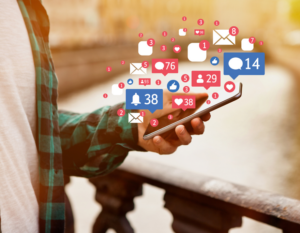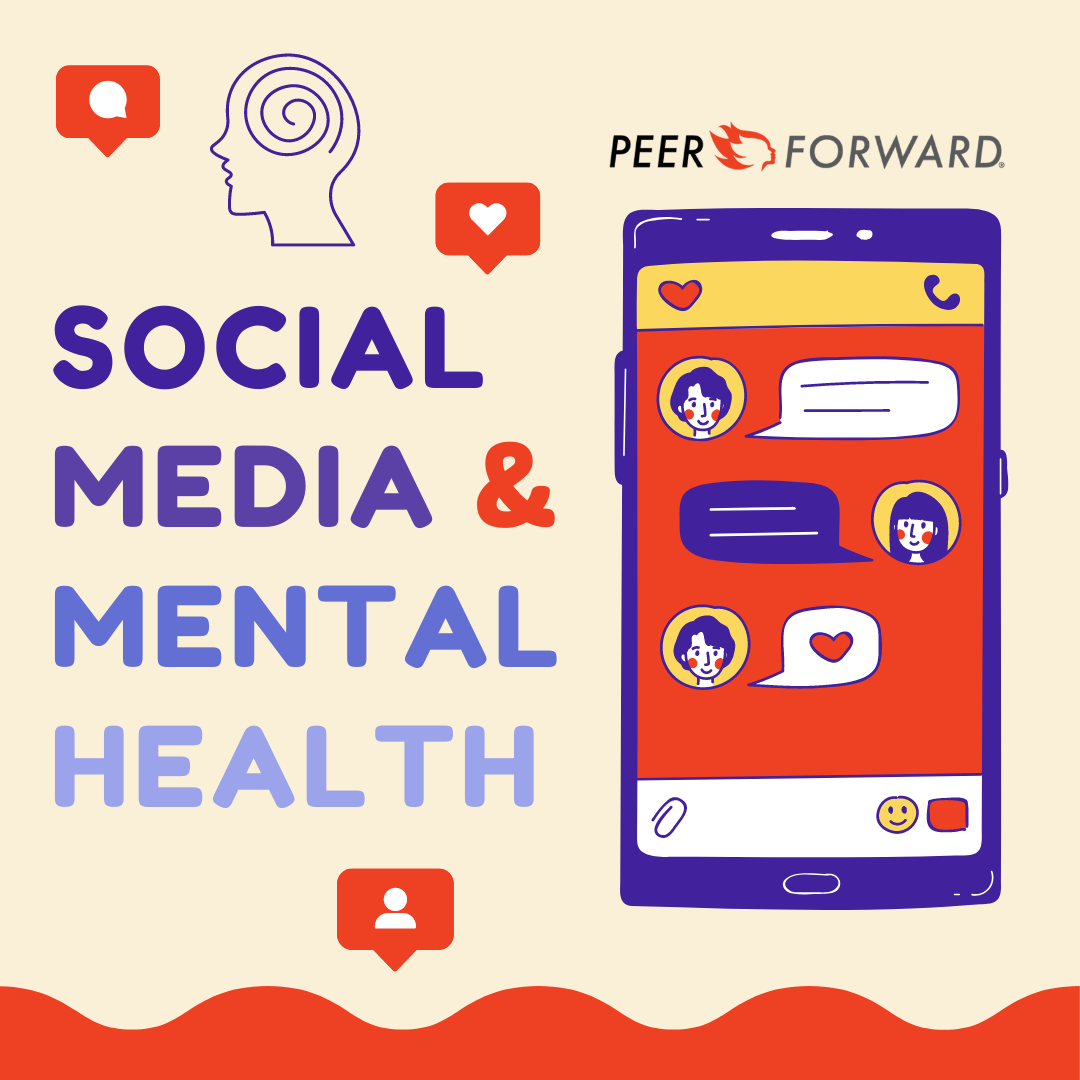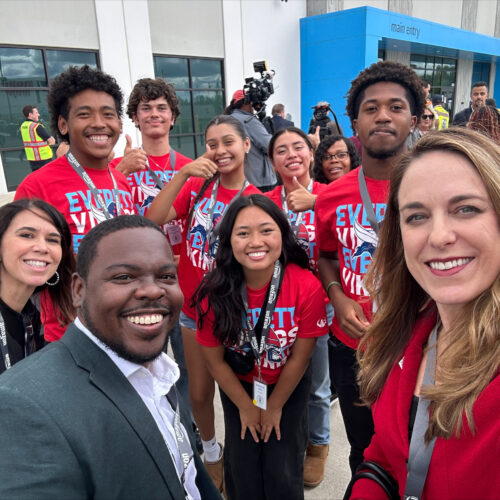
In a time where social media use is a vital aspect of socialization, it is no wonder why so many students report having at least one account. A 2018 study by Hopelab and Well Being Trust found that 93% of youth age 14-22 in the United States use social media, most of which report using it daily. Time and time again, studies have shown a strong correlation between heavy social media use and feelings of anxiety, depression, loneliness, and inadequacy. Despite the potential negative effects, it is still important to recognize that social media has affixed itself into many aspects of youth culture. While it is unreasonable to expect teens, or anyone for that matter, to fully give up social media, there are ways to mitigate the harm and make online experiences more enjoyable.
Here are our tips for preserving your mental health while using social media:
- Set screen time limits: Those who use social media heavily are more likely to experience adverse effects on their mental health. When you limit your time online, it allows you to stay grounded and avoid overwhelming yourself. Set time limits on apps you find yourself scrolling for hours on, such as TikTok or Instagram, and do your best to stick with it. Your mental health and other obligations will thank you!
- Remember to take breaks: If you find yourself particularly invested in one app and you can feel it is taking up too much of your time or impacting your mental health, consider deleting it for a bit. Studies show that even taking just one week to detox from social media leads to improvements in general well-being, including a significant decrease in feelings of depression and anxiety.
- Spending some time outside: Research shows that spending time in natural green spaces leads to both cognitive and emotional benefits. Finding time to step

People on a hike. away from your phone and explore nature leads to an increase in attentional functioning and self-control behaviors as well as improvements in mood, mental health and general emotional well-being. When you can find time, try visiting your local park, doing outdoor activities, or simply take a walk to reap the benefits of spending time outside.
- Plan face to face excursions with friends and/or family: Though social media is a great tool for communication, nothing beats face to face interactions when it comes to improving your mental health. Plans day trips, outings, or simple at home hang-outs with your loved ones when you can. Studies show that digital communication does not have the same power as face-to-face social interactions in helping to reduce anxiety and feelings of depression. It is important to strike a balance in how you interact with others. Try to avoid relying solely on your social media to fulfill your social needs.
- Don’t bring your phone with you to bed: Many of us are guilty of bringing our phones with us

Young woman on her phone in bed. to bed, and inadvertently spend hours scrolling as opposed to sleeping. Poor sleep habits contribute greatly to a decrease in mental health. Not only does using your phone before bed effect how much sleep you get, it effects the quality of your sleep as well. The blue light from your phone screen impacts your body’s natural production of melatonin, making it harder for your to fall asleep and wake up. This disruption to your normal sleep cycle can impact the amount of restful sleep you get each night.
- Turn off notifications: Turning off notifications is a surefire way to limit the time you spend on social media. When we get a notification, it is second nature for many of us to immediately reach for our phone to check it. This can snap you out of the present moment, distract you from your current task, and lead to mindless scrolling. In fact, these constant distractions and interruptions of daily activities are positively related to increased levels of depression, anxiety, and boredom proneness. Once you unlock your phone, it is hard to put it back down. Keeping notifications off can mitigate this effect, leading to less time spent on social media, and your phone in general.
- Keep your intentions in mind: If you are about to open a social media app, think carefully about what you want to get out of the time you are about to spend on the app. For example, if you are about to check Instagram, consider what exactly it is you want to see. If you open the app with the intention of checking up on your friends’ recent activities through new posts, be sure to stick to that. If you instead find yourself scrolling an influencer’s page and starting to develop negatives feelings towards yourself and your life, it is time to close the app. Be sure to stay present during your use of these apps to prevent mindless scrolling!
Apps you can utilize to improve your mental health and social media habits:
-
Calm – Calm is the #1 app for sleep, meditation and relaxation. It aims to help users improve sleep quality, improve focus, decrease stress and anxiety, and experience general self-improvement through its guided meditations, sleep stories, ambient sound playlists, and more.
-

Young woman meditating. Freedom – Freedom is an app designed to improve focus and limit time spent online. With Freedom, you can block websites, apps, and internet across all devices. You can start using it at any time, or set a schedule that allows you to control when you will have your access blocked in advance. There is even a locked mode available that makes it impossible to opt out of your focused session for the days when you know you need to focus the most.
-
Habitbull – Habitbull is an app that promotes healthy habit building. With Habitbull, you can break bad habits such as spending too much time online, or you can build positive habits like meditating daily. You can track your progress in the app and join communities of people with similar goals to build a support system.
- Liberate – Liberate is an app created specifically by members of the Black community, for members of the Black community. The app’s purpose is to create a safe space for Black individuals that supports developing a daily meditation habit with guided meditations such as “For the Ancestor in You” and “Turning Anger into Spiritual Support.” These targeted meditations promote healing, creativity, and community building, which helps to improve the mental health of the users.
Organizations that provide mental health resources and support to teens and young adults:
- The Steve Fund – The Steve Fund has developed a resource center created by young people, for young people called Evokate which acts as a tool for teens and young adults who are passionate about intersectional issues related to mental health and want to advocate for change. The resources and literature covers actions areas such as housing insecurity among LGBTQ+ youth, the school-to-prison pipeline, healing from intergenerational trauma and racism, and much more.
- The JED Foundation – The Jed Foundation has a Mental Health Resource Center that provides information about common mental and emotional health issues and shows teens and young adults how they can support their peers, overcome challenges, and make a successful transition to adulthood.
- Active Minds – The Active Minds Mental Health Advocacy Academy is a unique and paid opportunity that equips young BIPOC and LGBTQ+ leaders with the skills needed to engage in mental health advocacy, civic leadership, and political engagement. Their Peer-Powered Mental Health Curriculum for High Schools is created to provide students with the tools needed to facilitate the conversation about mental health with their peers in their classrooms or during after-school activities.












